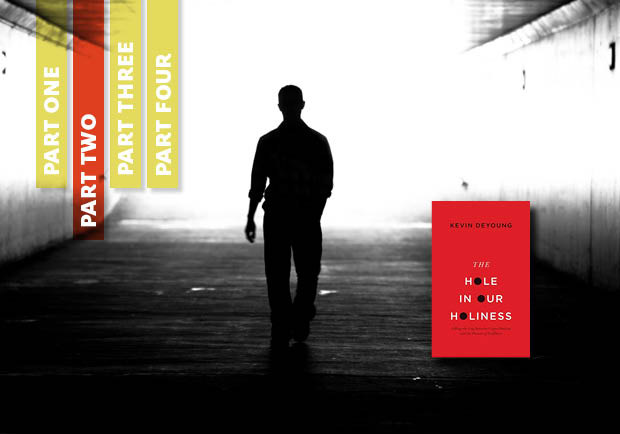This is the second of a four-part series of reviews looking at Kevin DeYoung'sThe Hole in Our Holiness. See part one.
The Hole in Our Holiness: Filling the Gap between Gospel Passion and the Pursuit of Godliness
Crossway
160 pages
$19.95
Imagine a college football coach calling a team meeting after his players receives accolades from the media and fans for their on the field performance. Instead of pats on the backs he sits them down and gets serious, pointing out a couple of troubling trends with their play. The team may feel good and even look good to fans, but to the discerning eye there are major omissions that bring concern.
In The Hole in Our Holiness, Kevin DeYoung is like that coach (or at least a team captain) on the gospel-centered team. He is pulling aside the squad, amid rounds of applause for its resurgent emphasis on gospel grace, and pointing out the danger of an underdeveloped theology and practice of holiness.
DeYoung writes: "The sky is not falling, and it won't until Jesus falls from it first. But we don't have to pretend everything else is wrong to recognize we don't have everything right. There is a gap between our love for the gospel and our love for godliness. This must change. It's not pietism, legalism, or fundamentalism to take holiness seriously. It's the way of all those who have been called to a holy calling by a holy God."
DeYoung is calling people back to the biblical concept and practice of holiness. This is an ambitious undertaking in and of itself, but what's more, DeYoung sets out to do it clearly and concisely (in just 144 pages!). In spite of the challenge, I think he hits a home run. He unpacks the biblical doctrine of holiness and places it within the framework of God's redemptive purposes. God is a holy God and he has saved his people to themselves be holy (1 Pet. 1:15-16).
Emphasis on Effort
The author anticipates the objection from some that his emphasis upon personal striving in the pursuit of holiness is either hopeless or legalistic.
To those who may throw up their hands out of hopelessness, DeYoung reminds them of the oft-neglected doctrine of the union with Christ. Believers are united to Christ by faith (Gal. 2:20). By virtue of this doctrine we have solidarity with Christ, transformation into Christlikeness, and communion with Christ. "Union with Christ," says DeYoung, "is like wedlock, we are joined to Christ in a covenant of love." Instead of equating holiness with perfection, Christians should equate it with obedience. By God's grace, in the power of the Holy Spirit, there is transformation—we actually can obey and please God.
To those who would decry such emphasis upon obedience as legalism, he reminds us that as Christians, we really are called to be obedient (Luke 6:46; Matt. 28:18-21; John 15). He is careful to show again that our basis for standing before God as accepted and holy is not our righteous works, but the imputed righteousness of Christ for us. Therefore, out of that acceptance there is powerful transformation that brings holiness in the life of the Christian.
In this vein, it is important to highlight what I think is a real strength of this book. DeYoung repeatedly emphasizes the need for personal effort in sanctification. In a section entitled "Effort is Not a Four-Letter Word," the author reminds us that while God is actively making us holy, we must still be working at it ourselves. "We must pursue God's gift to us," he writes. "Or as John Piper puts it, 'When it comes to killing my sin, I don't wait passively for the miracle of sin-killing to be worked on me, I act the miracle.'" Too often we may hear something like this and bristle against it, thinking it smacks of legalism or undermines the gospel of grace. Instead, we should remember that sanctification is sweaty work. The grace that opens the eyes to see is the same grace that opens our spiritual pores to sweat! I'm thankful for this biblical reminder.
I've come to expect that Kevin DeYoung's writing will be doctrinal, simple, and marked with humor and helpful antidotes. This book is no different. His writing style helps a weighty topic appeal to a wider audience. Further, I am encouraged by the frequent references to other authors and confessions. While I recognize that these men are not infallible, I see great value in preserving continuity within church history.
What DeYoung is proposing is not new. It is not a fad. It is Christianity. It is what Christians have believed throughout church history. I am sure some will hope that he would have gone deeper or delved into more specifics on occasion—and maybe this would have been helpful. However, if the author's goal is to remind us of the priority of holiness in the life of the church, then this concise little book does the job. I will heartily recommend it to members of our congregation as a tool to live in response to the gospel of grace.
Erik Raymond is a pastor at Emmaus Bible Church in Omaha, Nebraska. He blogs at Ordinary Pastor.










